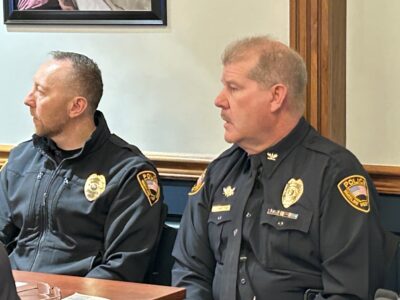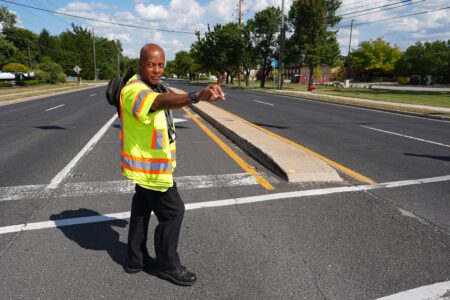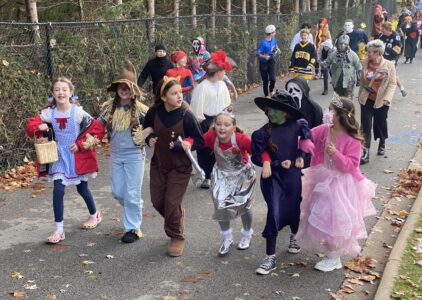Ohio County School Officials Plan To Educate Public About AI Manipulation of Photos

photo by: Joselyn King
Wheeling Police Deputy Chief Josh Sanders, left, and Chief Shawn Schwertfeger listen to discussion during a school safety committee meeting Friday at the Ohio County Schools Central Office.
WHEELING — Ohio County Schools is planning to work with the Wheeling Police Department to produce an educational video about the dangers of artificial intelligence and the manipulation of photos by school students.
The issue was the topic of discussion during a school district safety meeting Friday at the Ohio County Schools Central Office.
Wheeling Police Chief Shawn Schwertfeger said he wasn’t aware of an existing video on the dangers of AI and photo manipulation, but noted his office could certainly put one together.
Ohio County Schools Assistant Superintendent Rick Jones added the broadcasting students at Wheeling Park High School could certainly be of assistance, and that the school district and police department should work together on the project.
Jones began the meeting with the story of “Gavin’s Law.” Gavin — the son of a state senator in North Carolina — had been a model student. He began conversing with a female online, and their conversation resulted in him sending a graphic photo of himself to the female.
Shortly after, he was blackmailed and asked to provide a large sum of money to keep the photo from going public online. The experience resulted in Gavin committing suicide.
“That’s the first time I ever heard the term ‘sextortion,’ and it is a growing thing, apparently,” Jones said. “These people – they say they are almost always from foreign countries and they (law enforcement) can never catch them. They say the same exact things to kids (in an attempt) to get money from them, and it causes all kinds of problems.”
This has happened in Wheeling, Jones continued. The parents “refused to pay any money, and did what they had to do” to work with law enforcement and the incident didn’t get out of hand, he reported.
Now artificial intelligence and the use of technology to manipulate photos also is becoming a growing problem, according to school officials.
The tools needed for AI – such as image generators and voice cloning applications – are widely available to students, Jones noted.
“We have seen this here in Wheeling,” he continued. “We’ve had a handful of kids where people have had their photos taken off of social media, and (someone has) made images of them either nude or in very revealing clothes.
“There are kids still dealing with the results of that mentally and it’s going to get worse.”
Jones noted there also have been images of teachers subjected to AI manipulation. In at least one instance, a photo of two teachers not associated with each other has gone out online showing them kissing.
“It spreads out all over the place, and it is very concerning for schools and education in general,” Jones said.
Jack Doyle, assistant principal at Wheeling Park High School, informed those present AI photos already were affecting the school.
“At the high school, we had our first encounter yesterday (Thursday),” he said. “An individual simply took a picture of two females lined up at the bus stop, then was able to generate another image of them kissing.
“It caused some chaos. We didn’t know what we were getting into with this. But these girls were adamant that (any such photos) were fabricated.”
Doyle said administrators seek to remind the students the act of manipulating photos might not only be illegal, but is also “immature and inappropriate.”
“The students need to be more educated on this,” he continued.
While it is illegal under West Virginia Code “to fabricate or share intimate images” created by AI, the problem with the law is that having two people kissing in a photo isn’t considered an illegal act, law enforcement officials noted.
Some school districts have been educating the public about what to do when they are victimized by AI – which includes how to preserve evidence, and how to screenshot the evidence until law enforcement can take over.
There were 13% of principals who reported these AI-related incidents occurring in their schools, according to Jones.
In response, schools are updating their codes and policies to address AI-related behavior, blocking images, partnering with local law enforcement, training staff on recognition and response and hosting educational sessions for the public.
The most important thing the district can do are staff and awareness campaigns, Jones said.
“At the end of the day, the more we talk about things with students, staff and community. I think kids will see how bad it could be,” he explained. “They will learn that kids have been prosecuted for things like this, and what it does to the victims.”




